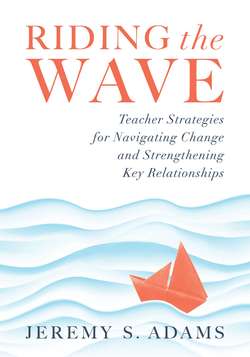Читать книгу Riding the Wave - Jeremy S. Adams - Страница 13
На сайте Литреса книга снята с продажи.
Flourishing as an Educator
ОглавлениеNo one in education is immune to the tension caused by constant change—not teachers, not students, not administrators. Thus, the advice and lessons this book offers for flourishing amid change should prove helpful to an assortment of educators.
Experienced teachers: Veteran teachers feel the weight of change because they have traveled a long road. They have experienced the relentless twists and turns of the education highway. Most of all, they are familiar with the frustration that comes from mastering a task or an expectation and then being told it is time to abandon what they have gotten used to. This frustration bears profound emotional and relational costs and is a primary concern that needs to be addressed in the profession. Denying this feature promotes burnout and a host of negative responses to one’s career. This book, then, invites these veteran teachers to give their own well-being the attention it deserves—to recharge and recalibrate.
New teachers: While veteran teachers can speak to the actual experience of enduring constant change, new and aspiring teachers must equip themselves with the strategies and tools that will be necessary to manage change throughout their careers. Most exemplars of the teaching profession hold it as an article of faith that teachers can always improve and there is always a fresh way to embody notions of classroom excellence. Doing what is required is a qualitatively different skill than knowing how to adapt and flourish when circumstances and expectations change. New teachers who come prepared to embrace the constancy of change will better position themselves to remain positive and purposeful in their careers. What the profession will require in five, ten, or thirty years is impossible to predict. We cannot know what turns lie ahead, but this book will help new teachers learn how to navigate them when they come—which they surely will.
Administrators: Within the educational ecosystem, administrators exist in a professional space that can be exceedingly uncomfortable. On the one hand, they have almost no power in deciding which trends, expectations, or policies to implement—that power typically belongs to policymakers, district trustees, and superintendents. On the other hand, they have the arduous responsibility of making sure teachers on staff implement the reforms that are being required of them. They facilitate the training, oversight, and activities that serve to bring about the desired changes. Administrators feel the weight of reform in their relationships with staff and anyone actively involved in administering and enforcing reform. Because much of teachers’ frustration occurs when administrators make their expectations unclear or communicate them in a manner that harms morale, this book will assist in creating positive lines of communication between administrators and their staff. Administrators will also familiarize themselves with the strain that constant change exerts on teachers and their classes. This will not only make administrators more empathetic but also equip them with tools to assist their teachers as they tackle changes together.
Teacher leaders: In this context, teacher leaders refers to teachers playing leadership roles in districts or at school sites—the ones who decide which issues teachers need to address and how they should address them. One can’t be an effective leader in a school or district without possessing an acute awareness of the different pressures teachers endure. With this book, leaders who help set policy or assist teachers in their practices will come to understand the causes of teacher difficulties and cultivate practices to successfully confront them. Teacher leaders have the power to facilitate the strategies suggested here, and they can bring them to their teachers and disseminate them to their staff and district. This text will be ideal for teacher book groups that meet to intensively explore new strategies and trends in the education profession.
This book’s advice on how to maintain a positive outlook about working in education is both timely and timeless. It’s timely because the research clearly shows that teachers feel overwhelmed by the broadening set of expectations being placed on their shoulders. And it’s timeless because policymakers or the wider public cannot quickly reverse a trend so characteristic of 21st century teaching.
According to journalist Dylan Matthews (2018), policymakers, think-tank researchers, and billionaires have the habit of viewing classrooms as laboratories for social and economic innovation. In brief, many of these well-intentioned educational advocates and entrepreneurs have their hearts in the right place. But their focus is squarely on the outputs of the education system. Everyday teachers, on the other hand, must confront the harsh reality that social, economic, and familial inputs have monumentally changed the way we go about educating students. Outsiders to the teaching profession want schools to transform society, but the reality is that society has transformed schools.
